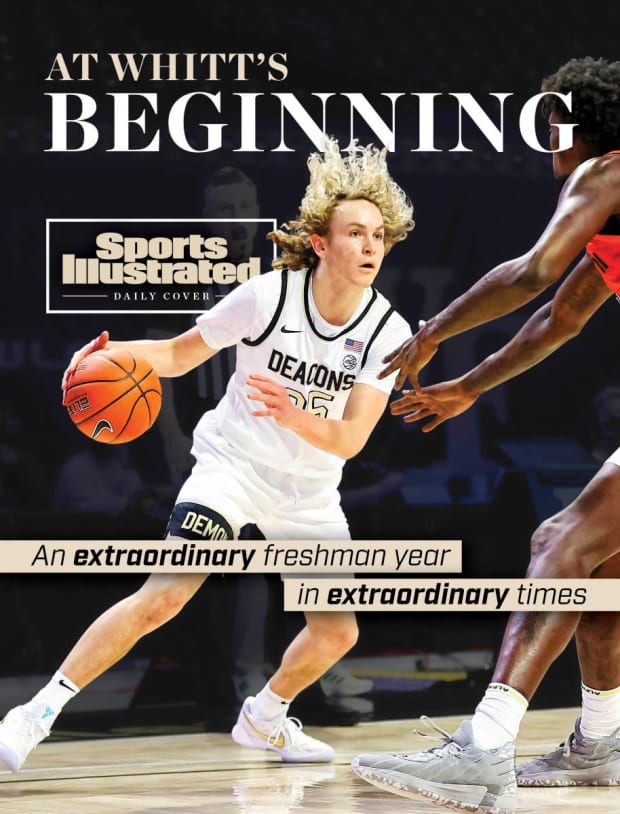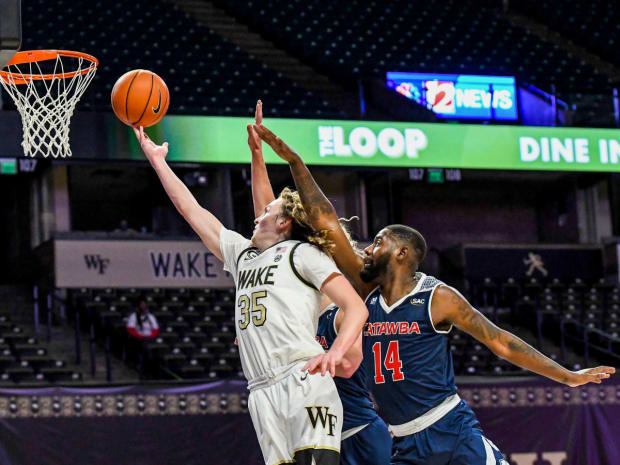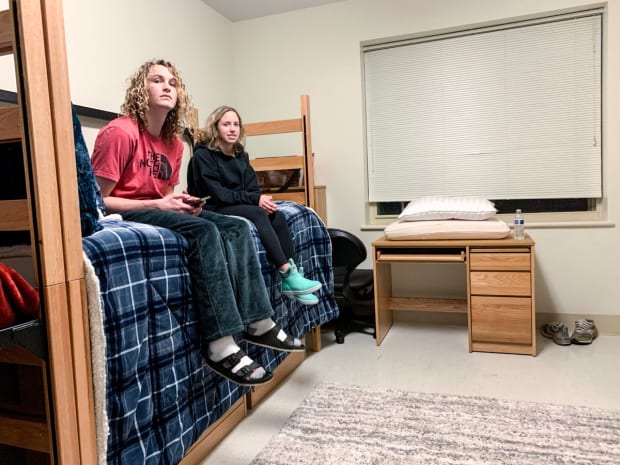Wake Forest's Carter Whitt is leading the pack of first-year players who got an early start thanks to a strange pandemic-created NCAA loophole
Before he did anything else at Wake Forest, Carter Whitt had to explain why he was there.
It was a few days before Christmas, and the place felt like a ghost town, with campus shut down for an extended winter break due to the coronavirus. As they drove up to an entrance gate, Carter and his father, Scott, were stopped by a security officer and questioned about what they were there to do.
Scott told the officer the truth. But he realized how ridiculous it sounded as the words left his mouth: I’m here to … drop off my 18-year-old son so he can join the basketball team?

With Carter seated in the car, the officer probably could not tell he was 6’ 4.” What he could see was a rail-thin teenager—listed at 180 pounds—with curly hair down to his shoulders. He also might have known that the Demon Deacons were already two games into their schedule.
“He was like, ‘Uh, yeah, right, you’re here for basketball,’ ” Scott recalls with a laugh. The officer instructed them to wait while he called the office of Wake coach Steve Forbes. But Forbes not only confirmed that the pair were telling the truth, he also told the guard he wanted to see them: The coach had never actually met Carter or Scott in person, because the recruitment process, like so much else last year, had taken place on Zoom.
This alone would have been enough to classify the situation as an only-in-a-pandemic oddity. But the context made it even more striking. A few days before, Whitt had celebrated his early graduation from high school. Now, on December 21, the point guard was getting dropped off to play college ball. He’d have a two-day quarantine—with multiple negative COVID-19 tests required—a week to practice and meet his teammates, and then his first NCAA game on December 31.
It was an unorthodox start to a basketball career: a midseason enrollment that meant jumping from high school to top-tier college conference play over winter vacation. But Whitt was not alone in making this tricky leap in 2020. Instead, he’s one of several high school players who took advantage of an unusual situation created by the pandemic. When the NCAA announced in October that it would extend an extra year of eligibility to Division I athletes competing in winter sports this year, the intent was to make sure any athletes missing their seasons didn’t lose out on a year of competition. But there was a side effect: Any athletes intending to start as freshmen next school year could show up now without starting the clock on their eligibility. It was, in effect, a free bonus season. For high school players who were interested in a last-minute change of plans to start college early, if their coaches wanted to have them, it could be a game-changer.
This presented a gift: an unprecedented chance to gain college basketball experience. It also presented a serious challenge.
“It’s going to just be such a great experience for me to have under my belt going into next year,” Whitt says. “Which is I guess my sophomore year. But kind of my freshman year.”

There are a number of players at prominent men’s basketball programs who have made a similar midseason transition this year: James Graham at Maryland, Meechie Johnson at Ohio State, Mac Etienne at UCLA, David Jones and Keon Edwards at DePaul, and at least eight others. (More than 20 women’s basketball players have done it, too.) Some have gotten the chance to play regularly while others have been eased onto their teams more slowly. But Whitt’s experience stands out: Of all the men’s players to make this quick jump from high school, he is one of just two to average more than 20 minutes per game and the only one to emerge as a semi-regular starter (the other is Dayton’s Mustapha Amzil). Though his stat line—4.2 points, 2.3 rebounds, 2.4 assists per game—is modest through 16 games, he’s become a regular contributor for Wake Forest.
Whitt’s playing time is partially a reflection of the state of his program. Wake Forest is very much rebuilding, in its first year under Forbes, and was shorthanded due to coronavirus issues when Whitt joined in December. But it’s also due to his skill in navigating the transition. Together, these factors created a perfect storm for a singular freshman season. Or … pre-freshman season?
“Next year is going to be his freshman year,” Forbes says. “Right? You’re going to say, ‘Oh, he’s playing,’ [but] next year is really his freshman year.” (Kind of. Technically, per the NCAA, this is his freshman year.)
“I don’t want to say it’s surreal,” says Russ Frazier, his coach for three years at Leesville Road High School in Raleigh. “But it’s very unique. We should be in a normal school day; he should be hanging out with me. ... Instead, I’ll turn on the television and pull for him and Wake Forest.”
Whitt’s arrival at Wake in December capped off a tumultuous few months for him. Over the summer, he’d decided to transfer from Leesville Road to New Hampshire basketball powerhouse Brewster Academy, hoping that after the pandemic disruption of the spring, he might be able to gain new experience and enjoy a more typical recruiting process. As it became clear that pandemic restrictions would not lift in the fall, however, Whitt reversed course and chose to finish high school back home in Raleigh.

But this did not mean a regular senior year for him. After committing to Wake in September, Whitt’s hope was to graduate early, arrive on campus in December and start as a redshirt in January. That meant no senior season at all: North Carolina had pushed the start of high school basketball to January 4 due to COVID-19, and by then, he planned to be at Wake Forest. (“In a regular, normal year,” Frazier says ruefully, just after his squad was pushed out of the playoffs in February, “he makes us possibly the best team in the state of North Carolina.”) Instead, Whitt worked out with a trainer—Bryan Burrell, his coach from middle school, who works with aspiring college players—and tried to prepare for experiencing college practices as a redshirt.
When the NCAA announced the waiver in October, Whitt did not change his plans. He and his family did discuss the possibility of playing—what it might look like, how prepared he was to make such a jump, whether there was a particular scenario that would make sense for him to try. But that conversation stayed purely hypothetical.
And then everything changed. Wake’s basketball program was hit with a COVID-19 outbreak and put on pause at the end of November. Forbes learned that two of his players were out indefinitely due to medical issues in mid-December. As the team stared down its return to the court, he took stock of his options, and he immediately thought of Whitt.
Which led to Scott’s phone ringing on December 17. He was at the bank, waiting to talk to a teller, and he picked up without even looking at who was on the line. He was surprised to hear that it was Forbes, and even more surprised to hear what he was suggesting: What would Carter think of coming to school early—say, in four days?—with a plan to play as soon as possible?
It was an offer that could shape the trajectory of his college career—a “free” semester now could give him experience that would set him up for success in the years ahead. Or, if it turned out to be too much, it could backfire. But Scott’s mind jumped first to something other than basketball.
“My immediate thought,” he says, “was Christmas.”
He knew that it was far from the most critical factor here. But the family had been looking forward to the holiday as one of their last moments at home together before Carter left for college at the end of December. “Normally, it’s the opposite. Kids are getting out of school for the holidays,” Scott says. “And I was taking him to school for the holidays.” It was hard to think of cutting short his final week at home with so little notice.
And then there was the matter of whether it even made sense for Whitt—not a guarantee, Forbes knew, which is why he had first called Scott. “I really wasn’t sure how Carter would react,” his father remembers. Given Wake’s situation, this was a scenario where he would not just be on the roster, but would be called on to actively participate, right from the start. He would have just a few days to start learning an entire offense and jelling with teammates he’d never met.
Forbes recommended that Scott wait until the next day to ask Carter: He knew that the family had planned a small celebration for Carter’s high school graduation on Friday and wanted the teen to enjoy it without any stress over this new decision. But Scott thought that Carter would want to hear it right away, and so he told him when he got home, unsure of what the answer would be.
“He immediately was like—I’m going. Didn’t hesitate,” Scott says. “That kind of surprised me.”
It surprised Carter a little, too: “I just kind of said, screw it,” he says. “And it worked out from there.”
The Whitts bumped up their family Christmas to December 20, and Scott dropped him off at school the next day. Less than two weeks later, the family was watching him play in his first college game.

The transition from high school to college basketball is difficult under ordinary circumstances—a faster and more physical game, an increased workload with extra responsibility, and, of course, everything that comes with adjusting to life as a college student.
Midseason, on short notice, and in a pandemic? Good luck.
“It just happened so fast that I really haven’t been able to take it in,” Whitt says. “Like, it just keeps coming.”
There were a few aspects of the situation that actually made the transition easier. A mandatory quarantine period is one way to start with a clear mind free of distractions. The fact that Wake was coming off weeks of hiatus due to COVID-19 meant that his first few practices involved everyone trying to get back up to speed. And a pandemic-altered university calendar meant that there were no other students on campus or classes to worry about for weeks. It was only after Whitt had been at school for a month and made multiple starts in conference play that he was able to have “a college experience besides just going to practice every day and hearing me yelling and screaming and blowing my whistle,” jokes Forbes.
All of the above helped make those early days somewhat smoother. But it still didn’t make them easy.
“You don’t practice the same in January as you do in July, August, September,” says Forbes. The practice environment that Whitt was dropped into this winter was “scout-based”—tailored to the specific skills and information needed for the next game. That’s a stark contrast from the summer and fall, when “practice is all about pace, tempo, playing hard, defending, getting bigger and stronger,” Forbes says. “He missed all of that.”
Whitt had tried to ready himself for college practices through his training sessions at home with Burrell. Even though they’d assumed he’d only be there as a redshirt, not actually preparing to play, they’d structured their work to that end. “I think the biggest adjustment for most college players is you have the weight room, you have individual workouts, you have film, you might have another practice on the same day—and he was already kind of doing those things,” Burrell says. But experiencing all of that in a new environment on campus, particularly with the goal of playing immediately, represented a different sort of challenge.
Whitt’s first few days were stuffed with film. Every little detail in practice felt crucial, and he was still trying to get to know his new teammates. “I just had to be more locked-in at practice than I’ve ever been,” he says, “Because there were so many plays, all this defensive stuff, thrown at me that I’ve never seen before.”
As Wake’s first game back from hiatus approached—against Division II Catawba College on December 31—Whitt found himself getting nervous. This was a foreign sensation; he could only remember feeling so anxious for a game once before, his first varsity game in his freshman year of high school. But that faded once he stepped on the floor. In 25 minutes of play against Catawba, he had 11 points and four assists. Wake picked back up its conference schedule a few days later, and before the week was out, Whitt started for the first time. (That start, against Virginia, was coincidentally the day of his high school team’s season opener.) He says he hasn’t felt nervous since.
“So he comes in and he practices—they’re not even real practices when he gets here, because we don’t even have 10 guys—then he plays against a D-II, then he gets thrown into the lion’s den,” says Forbes. “How would you do?”
It’s meant making mistakes on a bigger stage than Whitt’s ever had and having to remedy them more quickly than he’s ever needed to. “I think it’s really forced him to mature,” Scott says. Now, as Wake heads into the ACC tournament next week, Whitt’s still not even three months removed from high school.
He’s learned the offense well, Forbes says, gaining a solid command of the playbook quickly. But translating that from practice into conference play against big-time defenses has proved a little more difficult. “I think that’s part of the problem—playing against pressure, you can draw it up, you can scheme up all you want,” says Forbes. “Alright, well, you’ve got to get the ball, and then you’ve got to attack them, and make them pay.”
Overall, however, the coach says that he’s been impressed with Whitt—the goal for this year was simply to build a foundation for the years to come, and in his eyes, the point guard has been working toward that.
“They’re just letting me learn through playing and being on the floor—they’re playing through my mistakes,” Whitt says. “Which is something that I’m super thankful for.”
The situation still feels a little like an esoteric riddle: When is a freshman season not a freshman season? But while it may not take up any eligibility, Whitt is trying his best to make it count.
“I’d prefer guys to act like they’ve done it before,” says Forbes, which, while typically standard coach-talk, hits a little different for a scenario that no one has ever done quite like this. “And I think he’s been really good at that.”